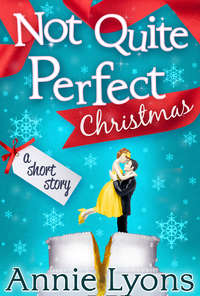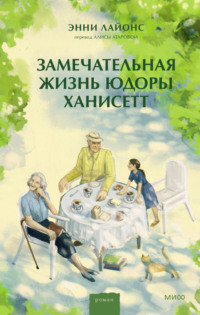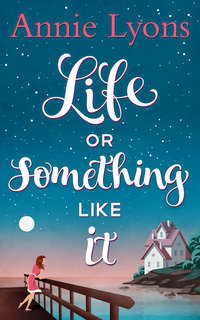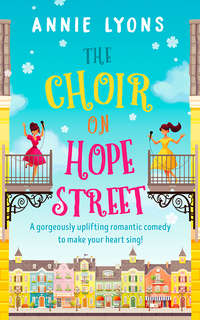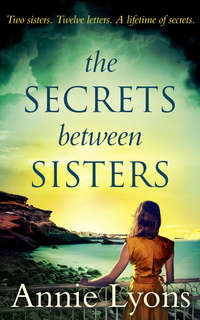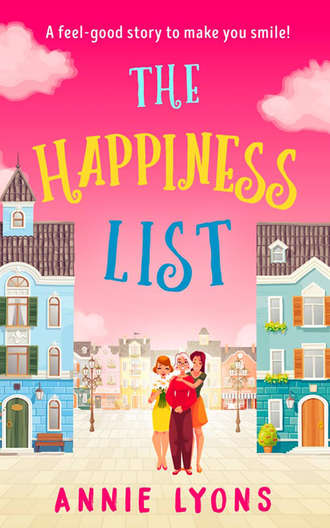
Полная версия
The Happiness List: A wonderfully feel-good story to make you smile this summer!

The Happiness List
ANNIE LYONS

Copyright
HQ
An imprint of HarperCollinsPublishers Ltd.
1 London Bridge Street
London SE1 9GF
First published in Great Britain by HQ in 2018
Copyright © Annie Lyons 2018
Annie Lyons asserts the moral right to be identified as the author of this work.
A catalogue record for this book is available from the British Library.
This novel is entirely a work of fiction. The names, characters and incidents portrayed in it are the work of the author’s imagination. Any resemblance to actual persons, living or dead, events or localities is entirely coincidental.
All rights reserved under International and Pan-American Copyright Conventions. By payment of the required fees, you have been granted the non-exclusive, non-transferable right to access and read the text of this e-book on-screen. No part of this text may be reproduced, transmitted, downloaded, decompiled, reverse engineered, or stored in or introduced into any information storage and retrieval system, in any form or by any means, whether electronic or mechanical, now known or hereinafter invented, without the express written permission of HarperCollins.
E-book Edition © July 2018 ISBN: 9780008221003
Version: 2018-05-10
For Rich, Lil and Alf,
who are always top of my happiness list.
Table of Contents
Cover
Title Page
Copyright
Dedication
Chapter One
Chapter Two
Chapter Three
Chapter Four
Chapter Five
Chapter Six
Chapter Seven
Chapter Eight
Chapter Nine
Chapter Ten
Chapter Eleven
Chapter Twelve
Chapter Thirteen
Chapter Fourteen
Chapter Fifteen
Chapter Sixteen
Chapter Seventeen
Chapter Eighteen
Chapter Nineteen
Chapter Twenty
Chapter Twenty-One
Chapter Twenty-Two
Chapter Twenty-Three
Chapter Twenty-Four
Chapter Twenty-Five
Fran
Pamela
A Letter From The Author
Acknowledgements
Keep Reading …
Also by Annie Lyons
About the Author
About the Publisher
Chapter One
Heather
‘And you’re absolutely sure you’re okay?’
‘Gem, I’m fine. Honestly.’
‘Because I know that Mother’s Day can be tricky.’
‘When you’re an orphan?’ asked Heather in a squeaky little-girl-lost voice.
‘You know what I mean, Heth. Remember the year you went AWOL.’
‘That was three years ago. I was in a funny place.’
‘Croydon, wasn’t it?’ teased Gemma.
‘Exactly. You were selfishly on your honeymoon…’
‘I’m sorry.’
‘…and so you should be. I was single, living in a dodgy flat in Thornton Heath, working at that school with the violent kids and depressed teachers. To be honest, it would have been some kind of miracle if I hadn’t ended up falling-down drunk in the Wetherspoon’s on George Street.’
‘The police had to take you home.’
‘And they were utterly charming. I’m not the first sad and lonely person to dance on a bar in Croydon and I doubt I’ll be the last.’
‘So you’re not planning to jump on a tram and head over there today?’
‘Gemma, those were pre-Luke, pre-engagement, pre-job in bakery, pre-lovely house on Hope Street days. I’m happy now. H-A-P-P-Y. Plus I’m planning to make the perfect New York cheesecake to welcome my perfect fiancé home from his perfect business trip.’
‘Sounds perfect.’
‘You better believe it, baby.’
‘So you’re sure you don’t want me to come over?’
‘Gemma. This is your first Mother’s Day as an actual mother. I appreciate you worrying about me and I love you dearly but you deserve to enjoy it with Freddy Fruitcake. How is my nutty godson by the way?’
‘Absolutely bonkers,’ laughed Gemma. Heather smiled as she heard the adoration in her voice. ‘I meant to say, we’re thinking of booking the christening for mid-May – does that sound all right?’
‘Sounds great and now you need to bugger off and enjoy your family time. I’ll catch up with you in the week.’
‘Okay. What time’s luscious Luke back?’
‘Around eight. Now stop worrying and get lost, loser.’
‘Love you.’
‘Love you too.’
Heather knew that New York Cheesecake was a risky thing to make for Luke – the self-proclaimed world cheesecake authority and a native New Yorker to boot. She had decided to seek advice from Pamela Trott, who made cakes for Taylor-made – the café and bakery owned by Caroline and Oliver Taylor, where Heather worked. Pamela was an incredible baker, whilst also being one of the nosiest people Heather had ever met.
‘I remember your nan,’ Pamela had said, beaming at her when they first met six months earlier. ‘Used to live two streets over from Hope Street. Lovely lady. Terrible gout. So you’ve decided to come back to your roots? That’s wonderful. And you’re engaged to that nice American fellow?’
Heather was astonished by Pamela’s insight. From the look on her face she was about to explode with joy at the prospect of Heather getting married.
‘Awww, your mum would be so proud if she could see you now, God rest her soul. I was very sad to hear about your parents passing away. Your mum and I used to play out together sometimes when we were little,’ said Pamela fondly. ‘Let me know if you need someone to bake the wedding cake – I’d be only too happy to help!’
Heather had given a polite smile and made a mental note never to tell Pamela anything she didn’t want the entire Hope Street community to know. She was, however, very keen to get her advice on baking. She’d practically swooned when she tasted Pamela’s mango and passion fruit cheesecake.
‘The trick to the perfect New York cheesecake is patience,’ said Pamela sagely. ‘You have to leave it to cool in the oven for two hours with the door shut and then leave it with the door ajar for another hour before you chill it.’
Heather did as she was told and felt a thrill later that day as she peered into the oven at the pleasingly honey-coloured crust. She left the oven door open a fraction and went into the living room to distract herself with another episode of Orange Is the New Black.
She felt as restless as a child waiting for Christmas. Luke had been away in New York for five days now. These trips were becoming increasingly frequent but he assured her that it was a good thing. He worked for an American drinks company and the stakes were high; soda was a serious business but Luke was doing well, with two promotions in the past twelve months. If he put in the hours, he was on track for the top. Heather understood. Of course, she’d like to see more of him but she wanted him to achieve the success he deserved.
Meanwhile, she had a job she enjoyed and a house she loved – an Edwardian mid-terrace with dark wood floors, original fireplaces and self-cleaning skylights. She had bought it six months ago with money inherited from her parents – an extravagant engagement present of which they would have certainly approved.
Heather settled on the sofa and caught sight of the last photograph of her with her parents. They were sitting at a café in Cornwall during the summer, her father grinning, her mother laughing and Heather smiling at them because they were reacting to something she’d said – some silly joke or remark. She hadn’t been able to look at that photo for years after her parents died, hadn’t been able to accept the fact that they were no longer in the world. But now, sitting here in her beautiful house with her gorgeous fiancé on his way home, she could smile at them and say, ‘Hey, Mum, Dad – I miss you but I’m okay.’
A while later, she went to the kitchen to transfer the cheesecake to the fridge and grinned. It looked perfect. She reached for her phone, ready to take a picture to post on Instagram.
The perfect New York cheesecake for my perfect New Yorker.
That should get a few likes. Unfortunately, she didn’t have a tight enough grip on the tin and the whole thing toppled out of her grasp, falling upside down onto the floor. She stared in horror for a second before realizing that her phone was buzzing with a call. Luke. Confused, she flicked the screen to answer. ‘Luke? Where are you?’
‘Hey, gorgeous. Listen, I got bad news. Snow in NYC – they grounded all the flights.’
‘Oh.’
‘Yeah, I know. I’m sorry. We should get moving tomorrow but I’ve no idea what time. I’ll keep you posted.’
Heather felt her cheeks burn with frustration. ‘It’s just disappointing, you know? I’ve missed you.’
‘I’ve missed you too but it’s only one more day, okay? I’ll make it up to you, I promise. I love you, Heather Brown.’
‘I love you too.’
‘Okay, I gotta go. See you tomorrow, beautiful.’
Heather stared at the blank screen and then down at the cheesecake-covered floor. She felt a prick of tears followed by a stab of irritation.
Get a grip, Heather Brown. Everything’s fine. There’s nothing to cry about. It’s not his fault. You’re just feeling emotional because it’s Mother’s Day. There’s no use crying over spilt cheesecake. Everything is completely fine.
Chapter Two
Fran
Fran was unloading the dishwasher when she found out that her husband had died. In fact, she was just cursing him for not rinsing the plates before stacking them so that they’d come out dirty again. Since that day, she often mused about the strangeness of the things she missed but lasagne-encrusted bowls, the carelessly dropped boxers in the corner of the bedroom, and his wallet on the side in the kitchen seemed to be right up there. They say you don’t know what you’ve got until it’s gone. They don’t know the half of it.
It was Andy’s best friend Sam who called her. They’d been having lunch together when it happened. One minute he was pincering a piece of tuna sashimi with his chopsticks, talking about their Easter holiday plans, and the next he was gone.
A sudden arrhythmic death or, rather ironically Fran always thought, ‘SAD’ for short.
Aged forty-one.
Really?
Really? Fran would scream at everything from the sky to the untidy shoe rack in the hall. This is really happening, is it? This is really fucking happening.
‘Anger is normal and natural,’ the counsellor told her. ‘A completely understandable part of the grief process.’
Of course, that just made her angrier. An anger as unquenchable as a raging thirst. That was her life during the weeks and months following Andy’s death. One towering rage after another. She hated it but most of all she hated herself. She could see the worry, fear and embarrassment in her children’s eyes as she lost it with everything from the broken washing machine to the UKIP candidate on Croydon High Street (although he had it coming). That was why she’d signed up for the counselling.
But it didn’t help. Not really. She didn’t want to be the tragic widow, going through the grieving process, having her feelings validated and coaxed. She didn’t want to be a widow, grieving or otherwise. Like Brexit or Donald Trump, widowhood was something she was not prepared to accept.
Fran spotted her mother parking her small white car in a huge space in front of their house, revving backwards and forwards in a futile attempt to get closer to the kerb as her father winced from the passenger seat. She was a terrible driver with an unwarranted fear of leaving her car outside Fran’s house ever since Bernie from three doors down had his stolen last year.
‘It was a BMW, Mum. The police said they were stealing to order. I doubt Fiat Puntos are on their wish list.’
‘I’ll have you know that my car is extremely nippy,’ Angela retorted.
Fran did a quick scan of the living room to check that it was up to her mother’s legendary standards of cleanliness. Widow or no widow, she would be the first to criticize a stray cobweb or a grubby skirting board.
In many ways Angela had been the perfect support for Fran. Her father was lovely but he would look at her with a sorrow that Fran couldn’t bear. She knew exactly what he was thinking.
My poor little girl – I’m supposed to protect her from all this but I can’t and I feel helpless.
Fran didn’t do helpless; it was an emotion she couldn’t afford.
‘What can I do, Fran?’ he’d pleaded.
Nothing, she wanted to shout. There is absolutely nothing you can do so stop asking. But this was her dad – her dear, kind dad, who just wanted to make everything all right.
‘Oh for heaven’s sake, Bill, stop fussing and go and play with Charlie,’ Fran’s mother had barked.
Bill looked wounded but nodded. ‘Of course,’ he said, shambling off to the living room in search of his granddaughter.
‘Harsh, Mum,’ remarked Fran.
Angela shrugged. ‘Don’t pretend you weren’t thinking the same thing.’
And that was the main reason why Fran had turned to her mother for support after Andy’s death. Angela Cooper took on grief like an unpleasant stain that needed attention. She refused to indulge her daughter’s predicament. She was never unkind – she just didn’t give Fran an opportunity to wallow.
‘You’re too young to be a widow,’ she’d remarked almost accusingly within hours of Andy’s death, as if Fran had made a disastrous life decision instead of being the walk-on part in a terrible tragedy. The flash of anger Fran had felt at this stupidly obvious comment had actually helped to distract her and probably stopped her from collapsing with sadness.
Now, satisfied that the living room was relatively dust-free, Fran went to the front door to greet her parents. ‘Kids! Granny and Grandpa are here,’ she called.
‘Happy Mother’s and Grandmother’s Day!’ cried Charlie, skipping down the stairs.
‘Thank you, dear,’ said Angela. She kissed Fran on the cheek as she stepped into the hall. ‘Oh my, look at that gigantic cobweb on your hall light. Don’t you ever dust?’
Fran gave a wry smile. ‘What would you have to moan about if I dusted?’
‘Probably the length of your hair,’ retorted Angela. ‘When did you last get it cut?’
Fran rolled her eyes as she leant over to hug her father. ‘Are you all right, Dad?’
He held his daughter at arm’s length, giving her his customary frown of concern. ‘I’m fine, Fran, but how are you?’
‘Right, let’s open a bottle, shall we? It is Mother’s Day after all,’ interrupted Angela.
Fran smiled. Praise the Lord for bossy mothers.
Angela put an arm around Charlie’s shoulder and followed Fran to the kitchen with Bill shuffling behind. ‘Either I’m getting shorter or you’re getting taller,’ she told her granddaughter.
‘And look what I can do,’ said Charlie, stretching her leg straight up and pulling it to her head with one arm.
‘Good heavens above, where did you learn to do that?’
‘Gymnastics,’ smiled Charlie proudly.
‘Amazing,’ said Bill.
‘Such talent! You don’t get that from your mum.’ Angela shot a glance in Fran’s direction before grinning gleefully at her granddaughter. ‘She gave herself a black eye whilst attempting a headstand when she was doing her BAGA Three Award – kicked her own knee into her eye!’
‘Mum!’ guffawed Charlie. ‘You never told me that!’
‘And I never would have either if it weren’t for your motor-mouth granny,’ said Fran, handing her parents their wine. ‘Happy Mother’s Day, Mum. Cheers, Dad.’
‘Cheers, darling,’ replied Angela. ‘Now where is that delightful grandson of mine?’
‘Probably upstairs plugged into his laptop. He’ll come down once he smells the roast.’
‘Why don’t you challenge Grandpa to a game of something,’ suggested Angela to Charlie.
Fran’s heart sank. She could tell that her mother wanted to ‘chat’, which usually involved her talking and Fran listening to a list of everything she was doing wrong.
‘Okay, Grandpa, how about Connect Four? Although, you should know that I’ve been practising with Jude and I’m getting pre-tty good,’ said Charlie.
‘You’re on!’ cried Bill, following her in the direction of the living room.
‘Come on then. Out with it,’ said Fran, once they were out of earshot.
‘What do you mean?’ asked Angela with feigned innocence. Fran raised her eyebrows. ‘Oh, very well,’ said her mother. She stood up straighter and fixed Fran with a look. ‘It’s time you acknowledged your grief.’
Fran scowled. ‘I acknowledge it every day of my sodding life.’
‘No you don’t, Fran, and I’m partly to blame.’
‘Wow. Can I have that in writing?’
Angela cocked her head to one side and pursed her lips. ‘You kept going because you had to and I encouraged that but in doing so you’ve never properly faced the grief.’
‘Funny, because I felt as if the grief was punching me in the face on a daily basis but obviously I was skipping through meadows of wild flowers without even realizing it.’
Angela raised her eyebrows. ‘This is exactly what I’m talking about.’
‘What?’ snapped Fran.
Angela gestured with her hands. ‘This. This attitude. This sarcasm. This dark humour. You’re not facing your grief. You’re railing against it. And in doing so you avoid the pain instead of facing it head on.’
Fran was incredulous. ‘What do you mean?’
‘I mean, my darling, you replace it with all manner of things – anger, cynicism and so on – when you need to open up because that’s the only way you can move on.’
‘I don’t want to move on,’ said Fran, folding her arms
Angela’s face softened. ‘I don’t mean forget Andy, I just mean get to a place where you can accept the world without him.’
‘Thank you, Professor Freud – you should have been my counsellor. It would have saved me a lot of bother.’
‘I just want you to be happy.’
Fran stared at her. She wanted to say, ‘I am happy,’ but there was no way she’d get a lie that big past Angela Cooper. She turned back to the carrot she was chopping and an uneasy silence descended. Her body stiffened as her mum placed a hand on her shoulder.
‘Just think about it, Fran. That’s all I ask. It’s been two years. Now shall I lay the table?’
‘Thanks.’
As her mother bustled round the kitchen, the same dead-end thought drifted through Fran’s head like a song on repeat.
Accept a world without Andy? Why on earth would I want to do that?
Chapter Three
Pamela
It was fine. Really. Absolutely fine. Two out of three Mother’s Day cards were fine. A declaration that the majority of her children were thinking of her. There were plenty worse off.
‘He’s a lazy, selfish bugger,’ Barry declared as they sat down to Sunday lunch. ‘Doesn’t think about anyone but himself. He lives the nearest and does the least.’
‘Oh shush, Barry. It doesn’t matter,’ said Pamela. But it did matter. Of course it mattered. Another moment in her life that she shrugged off, pretending she didn’t mind when in actual fact it exhausted her brain every waking second. Matthew. Her middle son. A constant worry and a big mystery to her.
Her other children were getting on with their lives. Her eldest, Laura was a chef, working for a trendy chain of Mexican restaurants in the West End, living in north London with her girlfriend, Jax. Her youngest, Simon was an app designer. He had set up his own business and become quite successful with a game called Run, Bob, Run, in which a gigantic polar bear called Bob had to run across various different landscapes, avoiding sharks, vultures and other similar nasties. Pamela had tried to play it once and felt rather sorry for Bob but apparently it was a big hit with pre-schoolers and meant that Simon could afford a lovely Georgian semi-detached in Bristol, which he shared with his software engineer girlfriend, Skye.
Pamela’s middle son Matthew, on the other hand, was a relatively unsuccessful journalist and writer, living in a flat-share in Clapham in the same place he had moved to after leaving university. He was thirty-three now and whilst the other residents had changed numerous times over the past twelve years or so, Matthew remained in situ. He made just enough money to get by, along with occasional handouts from Pamela.
‘Don’t mention it to Dad,’ she would cluck indulgently, posting a folded wad of twenty-pound notes into his pocket following another surprise visit. She chose to ignore the fact that he only popped round when he needed something. He was her son, after all. What was the world coming to if you couldn’t turn to your own mother in times of need?
Pamela stared down at her lunch – the perfect roast, with slices of tender beef, Yorkshires as light as clouds, crispy roast potatoes, veg and gravy. She glanced up at her husband, who was scoffing it with gusto.
‘Belicious,’ he declared through a mouthful of food. Within minutes, it was gone. Barry sat back in his chair, patting his bulging belly appreciatively. ‘Are you not eating, love?’ he asked, staring at her untouched food.
‘I’m not that hungry,’ she said.
‘Maybe have it later, eh?’ he ventured. Pamela nodded. ‘Right, well I’d best get back to it – got to get the peas in before dark.’ He hauled himself to his feet and left the room.
Pamela looked at the clock. Twenty past one on Mother’s Day. When families up and down the land were sitting down to celebrate the one who had given them life, who had brought them into the world and nurtured them as best they could.
And here she sat. Alone. While her husband tended his garden and her children got on with their lives. Weren’t these supposed to be her golden years – the time when she embraced her life again, like an old forgotten friend? And yet, Pamela had spent so long being a wife and mother that she felt like the last person at a party after everyone else had gone – sad that it was over and wishing she could do it all again.
She left the table and went upstairs to the box room at the front of the house where she kept her photographs. She liked to come in here, to wallow in the memories of when she’d felt really happy. She picked out a random album and flicked it open, smiling down at a photograph of the three children on holiday in Weymouth. They were sitting on the sand – Laura in the middle, Simon to her left and Matthew on her right. Laura had her arms around her brothers and they were all grinning, their faces covered with ice cream. Pamela knew their exact ages – Laura had been seven, a right little bossyboots, organizing her brothers for every activity from sandcastle building to beach cricket. Matty and Simon didn’t mind, of course. They were five and two and more than happy to comply with Laura who, as their big sister, seemed to know everything. They eyed her as if she was a mystical sorceress, holding the secrets of the universe in her pudgy grasp.


